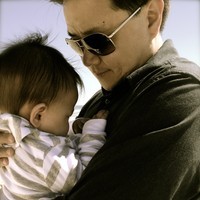This question originally appeared on Quora. 
Answer by Andrew Young Shin, MD, Clinical Assistant Professor, Pediatrics - Cardiology -- Stanford University
Last week, I was covered in blood. The tubing connecting my patient to the life support machine spontaneously ruptured and blood was hemorrhaging everywhere. While we were quickly repairing the defect, my hands were deep inside my patient's open chest to massage the heart to keep the circulation going. I still get the shakes from that moment. Unlike the television shows, there was no euphoria or 'high fives' after resolving the crisis. No part of me thinks this was a life saved. It was a death luckily averted and we all knew it.
A month ago, I came home after taking overnight call in the hospital. I hadn't seen my 2-year-old son in 48 hours. He had learned three new words and desperately wanted to play. I was so tired and desperately wanted to sleep. I forgot to hug my wife. I chose to play with my son, but I was a zombie. It wasn't a quality moment, and I think he knew it.
A year ago, a physician from a community emergency room called me asking to transfer a patient to my ICU. It was a teenager recipient of a heart transplant a few months ago and I knew immediately that the donor heart was being rejected by the immune system. The ER physician did all the wrong things and only contributed to destabilizing the patient. The patient was unlucky to have presented to an ER physician who was self-admittedly unfamiliar with pediatrics. I was so angry and frustrated ... not at the doctor individually, but at our medical system that is still so vulnerable to medical errors and misdiagnosis. The patient ultimately died and like the hundreds of thousand patients before him slipped through the torn safety net of our healthcare system.
Five years ago, I was signing the discharge paperwork of a 1-year-old after being hospitalized for 8 months following cardiac surgery. This patient suffered numerous complications related to his complex heart defect, including a massive stroke. After months of rehabilitation, he was now ready to go home, albeit with a fragile heart. As I was saying goodbye, I remember looking at his single mother and seeing fear in her eyes. Her son demanded special care and would unquestionably dominate her already stretched life. "I'm scared of my son. What if he tries to die again?" I tried to reassure her but couldn't find the words to soften the reality of the situation. "We are always here for you" and she half-smiled at that notion. When she was gone, the staff celebrated the success, but I couldn't shake the feeling we were single dimensional in our care. I couldn't feel balance or satisfaction. I called her a week later but got her voicemail. I left a message. I told myself to call again a week later. In the midst of the busy surgical schedule, I forgot to call her.
10 years ago, I entered the field of cardiology. Every child with heart disease was suddenly my patient, and I was suddenly an expert. A good friend of mine called me for consultation about a newborn baby with a murmur. I told him "dude, we were in the same class just a week ago, and you are calling me for advice?" I listened carefully at the murmur and thought it sounded benign. But to be sure, since I was early in my training I obtained an echocardiogram. I could not have been more wrong. The results showed a massive defect and the baby required surgery. My colleague congratulated me for the great pick up. I remember re-reading my note that clearly states "this murmur is likely benign in nature and no follow-up is warranted by our service". I remember asking myself when does luck become less of a factor in medicine?
As an adolescent, I had romantic notions on the life of a physician. The self-fulfillment and gratification that comes with being a healer appealed to me in an instinctual way. I thought that the profession was filled with glory, prestige, and honor.
The motivating factors to enter medicine are now different than the motivating factors sustaining me in medicine. The farther I advance in my profession, the more I realize the following: to think of myself as an individual is a fallacy. I've come to appreciate the 'we' behind health care delivery, including the family that resumes care beyond the hospitalization. I've come to appreciate that the only way to be better is not necessarily to perform better as individuals but to shed light on those dark blind spots within the system where our patients quietly fall through the cracks.
Years from where I started, there's less prestige and even less glory. But there's more honor than I could've imagined.
Yesterday, I was discharging one of my favorite patient from the ICU. Her post operative course was difficult and challenging, but this 8-year-old girl was bouncing to get home and with a wide smile on her face she declared 'I hope I never see you again!' to which I wholeheartedly whispered 'so do I.' Her mother thanked me for the care we provided. I used to hate it when I am thanked because it's awkward to say "you're welcome" or "no problem." But now, I know exactly what to say.
It's our privilege.